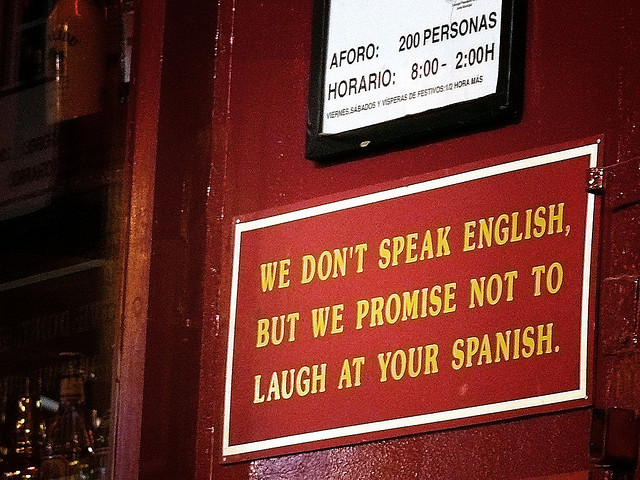
‘Speak’ graffiti on a brick wall.
Photo by Brooke Novak/CC, Flickr
Who’s speaking, please?
Biases can affect communication
Adapted from The Vancouver Sun by Nancy Carson
Level 3
Many people have stereotypes.
A stereotype is a strong belief
about a whole group of people
and every person in that group.
You feel that everyone in the group
is the same in some way.
Positive and negative
Stereotypes can be positive.
“Women are warm and loving mothers,”
Stereotypes can also be negative.
“Teenagers today have no manners.”
Some of these are myths that come from our culture.
“Asians are good at math.”
“Canadians are always polite.”

Three people communicating
Photo by Marc Wright/CC, Flickr
The effects of stereotypes
Stereotypes can create bias.*
A bias is a feeling you have
that makes you treat someone differently
from the way you treat other people.
Sometimes we are not aware
of our biases.
* (say: BY-us)
New UBC research shows how
racial stereotypes affect the ways
we listen to and understand each other.
UBC Study on communication
Molly Babel and Jamie Russell
are researchers at UBC.
Babel and Russell studied communication.
Babel is an assistant professor
with UBC’s Department of Linguistics.
Russell was an undergraduate student
during the study.
The study
Six males and six females from UBC
participated in the study.
Six said they were “White” and
six said they were “Chinese”.
All speakers were born
and raised in Richmond.
All were native speakers
of Canadian English.
Recording voices
Each member of the study recorded
the same sentence twice:
“The house had a nice garden.”
One recording had background noise.
The second recording had no noise.
Each recording had either a black and white photo
of the speaker or a photo of three crosses.
Listen to two recordings, click here.
Who’s speaking?
People listened carefully to the two sentences
from each speaker.
The listeners answered questions.
How easy is it for you to understand the speaker?
How strong is the speaker’s accent?

‘White’ female photo similar to one used in the study
Photo by Ben Raynal/CC, Flickr

‘Chinese’ female photo similar to one used in the study
Photo by Ben Raynal/CC, Flickr
What listeners heard
Most of the time, listeners
found the Chinese speakers
more difficult to understand.
But only when a photo
of the speaker was with the recording!
If the picture of three crosses was shown,
listeners had little trouble understanding.
If listeners saw a photo of a White Canadian,
they felt the speaker had less of a foreign accent.
Listeners said the White Canadian sounded
more like a native speaker of Canadian English.
White man and Chinese man:

Photo of ‘Chinese’ man similar to the one in the study
Photo by Michael Chen/CC, Flickr

Photo of ‘white’ man similar to the one in the study
Photo by Paul Trujillo/CC, Flickr
Being more sensitive
“This research brings to light our internal biases,
And the role of experience and stereotypes,
in how we listen to and hear each other,” Babel says.
Jamie Russell, co-author of the study,
said the results show that we
“need to be sensitive about
the stereotypes that we carry.”

We don’t speak English sign
Photo by Arkangel/CC, Flickr
Vocabulary:
- linguistics: the study of language and of the way languages work
- internal: happening inside a person

